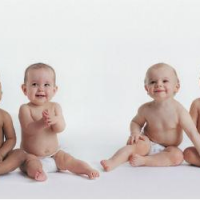Number of biracial babies soars over past decade
Share
Explore Our Galleries
Breaking News!
Today's news and culture by Black and other reporters in the Black and mainstream media.
Ways to Support ABHM?
By Carol Morello, The Washington Post
The number of mixed-race babies has soared over the past decade, new census data show, a result of more interracial couples and a cultural shift in how many parents identify their children in a multiracial society.
More than 7 percent of the 3.5 million children born in the year before the 2010 Census were of two or more races, up from barely 5 percent a decade earlier. The number of children born to black and white couples and to Asian and white couples almost doubled.
“I think people are more comfortable in identifying themselves, and their children, as mixed race,” said William H. Frey, a Brookings Institution demographer who analyzed detailed census data on mixed-race infants. “It’s much more socially acceptable, more mainstream, to say, ‘That’s what we want to identify them as.’ ”
Read more of the story here.
Many biracial people struggle to accept all of themselves.










Comments Are Welcome
Note: We moderate submissions in order to create a space for meaningful dialogue, a space where museum visitors – adults and youth –– can exchange informed, thoughtful, and relevant comments that add value to our exhibits.
Racial slurs, personal attacks, obscenity, profanity, and SHOUTING do not meet the above standard. Such comments are posted in the exhibit Hateful Speech. Commercial promotions, impersonations, and incoherent comments likewise fail to meet our goals, so will not be posted. Submissions longer than 120 words will be shortened.
See our full Comments Policy here.